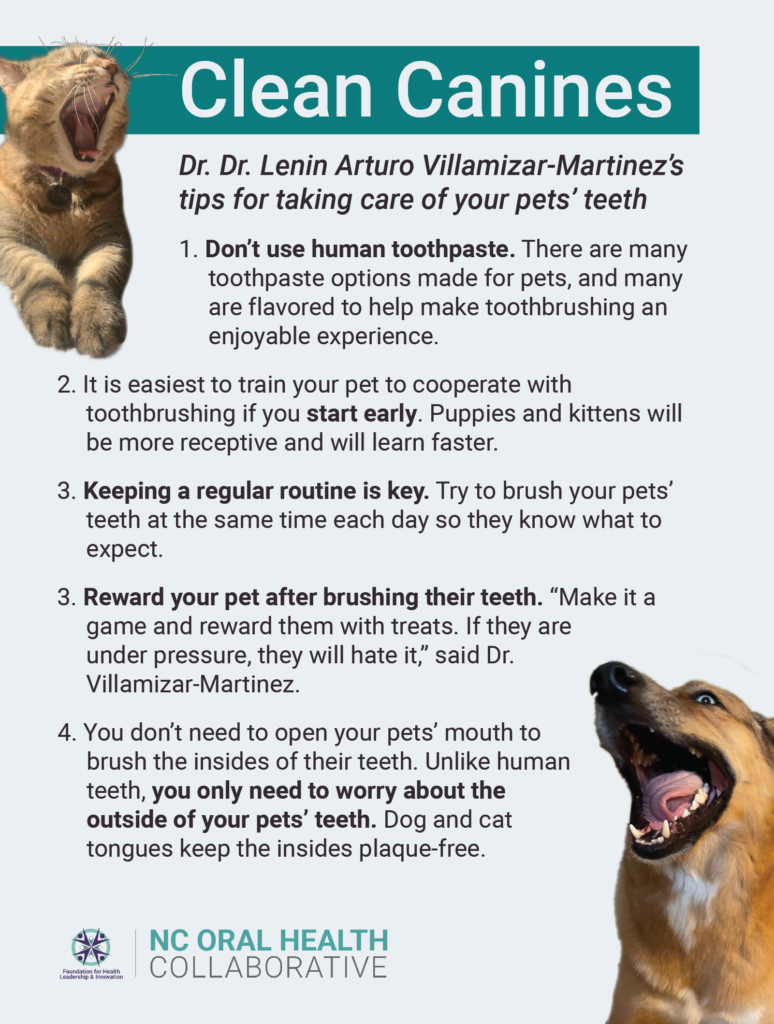Your furry friends need regular oral health care, just like you. Unfortunately, good information can be hard to find, care can be expensive, and too many people simply don’t know what they should be doing to keep their pets’ mouths happy and healthy.
Dr. Lenin Arturo Villamizar-Martinez, DVM, MS, PhD, Dipl. AVDC, is a board-certified dentist, head of the Dentistry and Oral Surgery Service of the Veterinary Teaching Hospital at the North Carolina State University College of Veterinary Medicine.
Dr. Villamizar-Martinez sat down with us at NCOHC to talk about animals, their mouths, and what best practices pet owners should be aware of.
What should people know about their pets and their mouths?
“The first thing that the owner needs to know is to brush their pets’ teeth daily,” said Dr. Villamizar-Martinez. “The teeth in dogs are equal to teeth in humans.”
He said that humans do tend to have more issues with cavities than their pets, but around 80 to 85 percent of dogs have periodontal (gum) disease. Regular brushing can help prevent gum disease and other issues that lead to expensive treatments down the road.

According to Dr. Villamizar-Martinez, choosing your pets’ toys wisely is another way to ensure that they maintain good oral health.
“There are a lot of products on the market for chewing,” he said. “Something that we recommend is to use any toy that you can make an indentation in with your fingernail. That toy will be soft enough to not cause a fracture on the teeth—that is a problem that we see a lot of.”
Softer toys will also rub your pets’ teeth when they are chewing, helping remove dental plaque. Harder toys like bones, on the other hand, can end up causing serious issues that lead to costly procedures.
“Research shows that these kinds of toys (bones and other hard toys) are related to complicating crown fractures, and at this point the only treatment that exists is to do root canal therapy or to extract the tooth,” said Dr. Villamizar-Martinez. “And that is expensive. When we are talking about root canal therapy, that ranges between $1,500 and $3,000. You can avoid that just by picking good toys for your dogs and cats.”
Before you jump up and search for new toothpaste or replacement toys online, Dr. Villamizar-Martinez said that there is a lot of inaccurate information on the internet. It can be hard to figure out what is actually good or bad for your pets online, and it is always better to ask for advice from your primary veterinarian.
He also recommends that pet owners visit the Veterinary Oral Health Council’s website. The VOHC reviews pet products and publishes lists of everything from pet toothpastes to toys, treats, and food that meet good oral health standards.
So, my dog is no longer a puppy (or my cat is no longer a kitten) and they aren’t used to having their teeth brushed. What do I do now?
“I’m living that experience right now,” said Dr. Villamizar-Martinez, talking about his newly adopted six-year-old dog, who never had his teeth brushed before.
He recommended to start by taking your pet in for a professional dental cleaning if possible.
“The first thing I did was put him under general anesthesia and did a professional dental cleaning,” said Dr. Villamizar-Martinez. “Then I said, ‘Now I need to start brushing her teeth !’”
He said the easiest way to start brushing a pet’s teeth is to use your finger first, mimicking the brushing motions you will eventually use a toothbrush for.
“After two or three weeks, your dog will know that it is normal and good, then you can move to a toothbrush,” said Dr. Villamizar-Martinez.
What do I do if I think my pet has an issue in their mouth?
“First, go to your primary veterinarian,” said Dr. Villamizar-Martinez.
General practice veterinarians can diagnose most oral disease, and they can run any blood tests or other diagnostics that may be necessary. If your pet has an issue, the veterinarian will be able to point you in the right direction for next steps.
Dr. Villamizar-Martinez said that many general practice veterinarians are trained to do professional dental cleanings and extractions if necessary. If your pet’s needs are more complex, your veterinarian should be able to recommend a veterinary dental specialist.
If you do find yourself taking your pet in for an oral procedure, Dr. Villamizar-Martinez said to make sure to only go to specialists who offer procedures under general anesthesia. A quick Google search will reveal many specialists who offer “anesthesia-free” procedures, but they are generally only cosmetic fixes that don’t fix the root of your pet’s disease. In many cases, Dr. Villamizar-Martinez said that these kinds of procedures can even make problems worse.
What about the cost of care?
Specialist veterinary procedures can be expensive, and unfortunately there aren’t many resources available for pet owners with financial constraints.
“Prevention is the most important thing at this point,” said Dr. Villamizar-Martinez. “That is the number one thing that is going to help.”
Dr. Villamizar-Martinez said that the NCSU College of Veterinary Medicine has been planning to start a program to offer veterinary solutions for shelter and rescue organizations that can’t afford to pay.
“We were thinking of adding some kind of pet dental care for shelters and rescue organizations who don’t have financial resources,” said Dr. Villamizar-Martinez. “Dr. Kelli Ferris, one of our faculty, directs our Mobile Veterinary Hospital. Veterinary students under Dr. Ferris’ supervision perform spay and neuter procedures. We were planning to incorporate dentistry, but the pandemic got in the way, at least for now.”
NCOHC is a program of the Foundation for Health Leadership & Innovation. To get involved, find out more information, and to stay up to date, head over to NC4Change to sign up for our newsletter and see what events and other opportunities are on the horizon.


